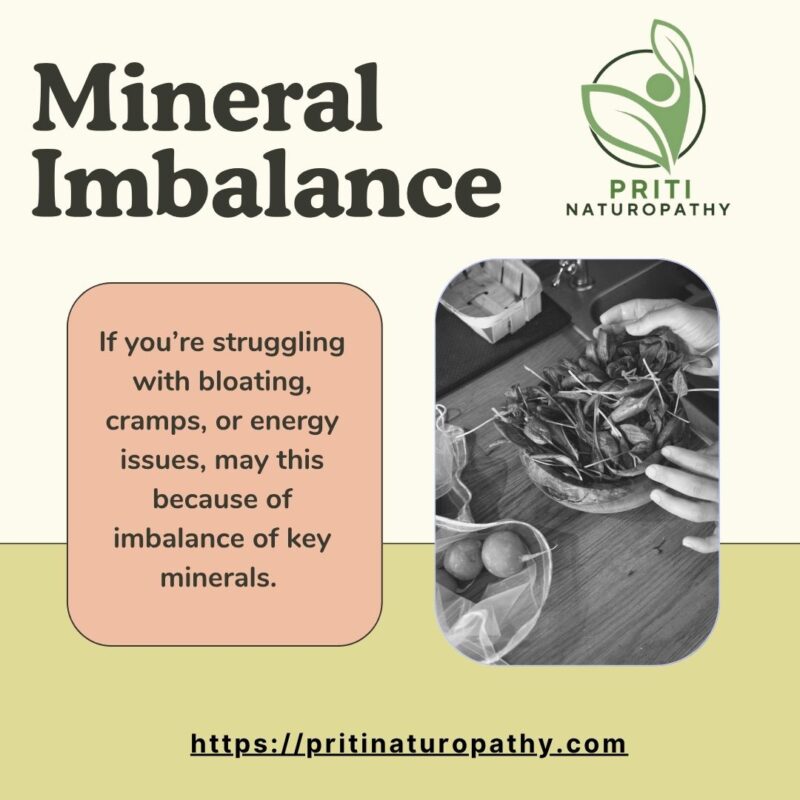Introduction: The Hidden Cause Behind Everyday Symptoms
When we talk about health, most people think of vitamins or protein. But there’s something just as important that often gets overlooked — minerals.
Yes, minerals like potassium, magnesium, and sodium are tiny, but they silently manage major roles — from digestion to heartbeat, energy to sleep.
Many of the clients I meet complain of fatigue, bloating, anxiety, or even cramps. And in most cases, the reason is simple — mineral imbalance.
In this article, I’ll guide you on how these three minerals affect your health and how you can bring them into balance using naturopathy and natural food sources.
Why These Minerals Matter
Let’s understand their basic function:
- Potassium – Lives inside your cells and controls water balance, digestion, and nerve functions.
- Sodium – Lives outside the cells and regulates hydration, blood pressure, and muscle function.
- Magnesium – The “quiet manager” that supports 300+ enzyme actions, calms nerves, and helps absorb potassium.
These three minerals are like the electrical wiring of your body. If one wire gets weak, the whole system suffers.
What Happens When They’re Out of Balance?
Potassium
- Maintains water balance inside cells
- Helps muscles and nerve’s function
- Regulates your heartbeat
Low potassium = tiredness, cramps, bloating
Magnesium
- Relaxes muscles
- Improves sleep
- Absorbs potassium
- Balances hormones
Low magnesium = anxiety, tingling, poor sleep, muscle stiffness
Sodium
- Maintains fluid outside the cells
- Regulates blood pressure
But the problem is — we often eat too much sodium from chips, cheese, and packaged food.
This creates an imbalance and pushes potassium out.
The Interconnection: How These Minerals Affect Each Other
These minerals don’t work alone — they need balance:
- Low Potassium, normal sodium = sodium takes over → bloating, cramps, fatigue
- Low Sodium, normal potassium = dizziness, dehydration, weakness
- Low Magnesium = potassium gets flushed out → anxiety, numbness, muscle cramps
So even if you’re eating healthy, you may feel something is off — this hidden mineral imbalance could be the real reason.
Symptoms of Mineral Deficiency
If you feel 2–3 of these symptoms regularly, mineral imbalance might be the cause:
- Muscle cramps (especially in legs)
- Constant fatigue or weakness
- Digestive problems like constipation or bloating
- Tingling or numbness in hands/feet
- Irregular heartbeat or restlessness
- Anxiety, mood swings
- Water retention or puffiness
Foods That Naturally Restore Mineral Balance
No need for supplements. Just add these natural sources into your diet:
Potassium-Rich Foods
- Bananas
- Coconut water
- Spinach
- Potatoes
- Lentils
- Tomatoes
- Beetroot
Magnesium-Rich Foods
- Pumpkin seeds
- Almonds
- Dark chocolate
- Whole grains
- Leafy greens
Natural Sodium Sources
- Rock salt
- Celery
- Beetroot
- Seaweed
(Avoid regular table salt)
Simple Meal Ideas Based on Your Lifestyle
You might be thinking, “Okay Priti, I know what to eat, but how do I use these in my meals?” Don’t worry — here are simple and practical options:
Pregnant Women
- Banana + coconut water smoothie with dark chocolate
- Spinach curry + whole grain roti
- Beetroot-potato salad + quinoa
Active/Sports People
- Oats + banana + flaxseeds
- Beetroot + tomato salad with almonds or pumpkin seeds
For Everyone
- Coconut water + banana + almonds
- Lentil curry + rice + spinach
- Millet salad with beetroot + pumpkin seeds
Even one such meal a day will begin to reset your body’s internal mineral balance.
How Your Body Uses These Minerals
Once you eat mineral-rich food, they are absorbed in the small intestine and transported to where they’re needed: cells, muscles, organs.
Any excess is gently flushed out through sweat or urine. This is why natural sources are always better — no risk of buildup or artificial overdose.
Naturopathy Tips to Support Mineral Health
Along with diet, these simple naturopathy habits enhance absorption and overall health:
- Daily sunbathing for natural Vitamin D
- Replace table salt with mineral-rich rock salt
- Deep breathing (Anulom Vilom) to balance nerves
- Avoid packaged foods and refined sugar
- Weekly fasting (only if suitable for your body) to detox the gut
- These are gentle ways to reset your body — inside and out.
Final Words
Your body is intelligent — but it needs the right fuel and care. When minerals like potassium, magnesium, and sodium are in sync, your digestion improves, your mind calms down, your sleep becomes better, and your energy feels real.
Don’t wait for symptoms to get worse.
Don’t chase pills or quick solutions.
Listen to your body. Eat natural. Heal naturally
If you’re struggling with bloating, cramps, or energy issues — book a free consultation at Priti Naturopathy and let’s understand your body better, together.
Frequently Asked Questions (FAQs)
Q- What are the symptoms if minerals are not balanced in the body?
Sometimes, our body gives us signs like leg cramps, tiredness, bloating, or even mood swings — but we don’t connect them to minerals. When minerals like potassium, magnesium, or sodium are low, these little signs start showing up. You might feel low on energy, have constipation, or feel your heartbeat is not normal. If this is happening often, don’t ignore it — your body is asking for help.
Q- Which foods should I eat to increase potassium naturally?
You don’t need anything fancy. Just include simple foods like bananas, coconut water, tomatoes, spinach, potatoes, lentils, and beetroot in your meals. These are easy to find and support your body in balancing potassium naturally.
Q- How do I know if I have magnesium deficiency?
Magnesium deficiency shows up in a subtle way — you may feel restless at night, get leg cramps, anxiety, or even tingling in your arms and legs. If your sleep is disturbed or you feel mentally tired, magnesium might be the missing piece. I see this very often, and in many cases, just adding the right foods makes a big difference.
Q- Can I fix mineral imbalance at home without supplements?
Yes, absolutely! That’s the beauty of naturopathy — nature has already given us everything we need. By eating the right foods, taking sunbaths, drinking coconut water, using rock salt, and avoiding packaged food, you can bring your minerals back in balance. It may take a little time, but it works gently and deeply.
Q- Can low minerals cause anxiety or poor sleep?
Yes, they can. Especially when magnesium or potassium are low, people feel anxious, restless, or wake up tired even after 8 hours of sleep. Minerals are not just for the body — they also calm the mind. So, if your mind is overactive or you’re feeling uneasy without reason, do check your mineral intake.
Q- Can magnesium deficiency affect fertility?
Yes, it can. Magnesium quietly supports many hormone-related functions in our body, including those linked to the reproductive system. If magnesium is low, it may disturb hormone balance and even affect ovulation in women. I’ve seen cases where women struggled with irregular cycles or hormonal ups and downs, and once we improved their magnesium levels through diet, things started to settle naturally. So yes, it’s an important mineral to watch if you’re thinking about fertility or hormonal health.


Leave a Reply